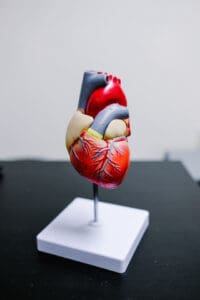Do you ever find yourself getting heartburn immediately after eating, especially when you move around too much? It sucks, right? Well, in this article, we’ll dive into its root cause and give you some useful advice on how to avoid and treat it. But first, let’s have a look at what heartburn is.

What Is Heartburn?
Heartburn is a burning sensation in your chest that worsens after meals, when lying down, or when bending over.
If you only get it occasionally, there’s no need to be alarmed. Most people manage it by simply making a few lifestyle changes and taking over-the-counter medication.
However, if your heartburn is more frequent and is affecting your daily routine, it might be a symptom of a more serious underlying medical condition that requires medical care.
But what exactly causes heartburn?
What Causes Heartburn?
Heartburn occurs when stomach acids become backed up in your esophagus (the tube that runs from your mouth to your stomach). The burning sensation results from stomach acid moving into the esophagus through a flaw in the lower esophageal sphincter (LES). The LES is a valve that connects the stomach to the esophagus.
When the LES becomes weakened or doesn’t connect properly, stomach acid can flow back into the esophagus, thus causing a burning sensation, heartburn.
Numerous things can trigger heartburn, the most common of which is spicy food or certain types of medication.
What Are Some Foods That Cause Heartburn?
Here are some of the things that you should avoid if you’re prone to heartburn:
- Spicy food
- Acidic food
- Big meals
- Chocolate
- Tomatoes
- Citrus food
- Coffee
- Onions
- Cheese
- Aspirin or ibuprofen
- Peppermint

Being pregnant or overweight can also trigger heartburn due to the added pressure on the stomach and abdomen. Also, cigarette smoke relaxes the LES muscles, which releases stomach acids, thus resulting in heartburn. Some sedatives can also cause heartburn.
How do you know if you’re having heartburn? Read on to find out.
Symptoms of Heartburn
The most common symptom of heartburn is a feeling of heat, warmth, or burning in the chest and throat. This feeling is caused by stomach acid flowing back into the esophagus.
Unlike the stomach, the esophagus does not have a lining to protect it from inflammation caused by the action of stomach acids. Therefore, when acid flows back into your esophagus, it irritates its lining.
Other symptoms of heartburn include:
- A burning pain, much like that of indigestion
- An acrid, foul taste in the mouth
- A burning sensation in the middle of your chest
- Coughing
- Hoarseness
Most of these symptoms are mild. But in some rare cases, they might be accompanied by severe chest pain or pressure, which comes combined with other signs and symptoms like difficulty in breathing or pain in the arm or jaw. Chest pain may be a symptom of a heart attack, and due to the similarities between the two, it might be difficult to tell them apart.
You should see a doctor if:
- You have difficulty swallowing
- Heartburn happens more than twice a week
- You have persistent nausea or vomiting
- You have weight loss due to difficulty eating or loss of appetite
- The symptoms persist even after taking over-the-counter medication
If you suspect that you’re having chronic heartburn, it’s wise to visit your physician to confirm your speculations. Here’s how your doctor will diagnose your condition.
Heartburn Diagnosis
Heartburn is a pretty common complaint. However, due to its common symptoms, it’s often confused with other chest-related illnesses, including:
- Pulmonary embolism
- Heart attack
- Pneumonia
- Chest wall pain
A heartburn diagnosis begins with a complete physical examination. This provides enough information for medical professionals to make a reasonable diagnosis and begin a treatment plan. However, in some cases, further testing might be required.
In such cases, your doctor might perform an X-ray, whereby you are asked to swallow Gastrografin or barium, while a radiologist watches the materials travel down your esophagus and into the stomach.
Apart from detecting any irregularities or inflammation within your esophagus, the test can also determine if your esophagus muscles are working properly and in a rhythmic motion to push food down toward the stomach. Apart from X-rays, your physician might also perform an endoscopy or Manometry and pH testing.
After being diagnosed with heartburn, the next step would be to treat it. Here are some of the most common treatment remedies for the disease.
Heartburn Treatment
Heartburn is treated according to the frequency and severity of the symptoms. Your physician might also consider whether or not there are other complications.
Lifestyle Changes
Certain dietary and lifestyle changes can help relieve symptoms of heartburn. If you have mild symptoms, you can try making simple lifestyle adjustments before seeking medical attention. However, if your symptoms are more severe, it’s a good idea to talk to your physician before making any changes so they can advise you on how to approach other treatment options.
Losing Weight
If you are overweight, losing weight can help reduce heartburn. It also has other health benefits, including a reduced risk of heart disease and type 2 diabetes.

Avoiding Foods That Trigger Symptoms
Some foods can cause relaxation of the LES, which then leads to heartburn. If you notice your symptoms worsening after you take certain foods or beverages, it might help to limit or avoid them entirely.
Here are some foods that can alleviate heartburn:
- Milk
- Ginger
- Apple cider vinegar
- Lemon water
- Whole Grains
- Fruits and Vegetables
- Yogurt
- Lean proteins
- Legumes
- Nuts and seeds
- Melons and bananas
- Oatmeal
- Bread
- Rice
- Egg whites
- Celery
- Cucumber
- Watermelon
- Apples
- Cranberries
- Cardamom
- Brown rice
Please note that while these foods have been suggested as potentially helpful for heartburn, individual responses can vary. It’s always important to consult with a healthcare professional if you’re experiencing persistent heartburn or other health concerns.
Over-the-counter Antacids
Antacids neutralize stomach acids and can be used to relieve heartburn symptoms. Although they work pretty fast, their effects only last for about 30 to 60 minutes after each dose.
The Bottom Line
About 60 million Americans suffer heartburn at least once a month. The worldwide number is much higher. Luckily, with a few lifestyles and dietary changes coupled with over-the-counter medication, you can significantly reduce your likelihood of getting heartburn.
